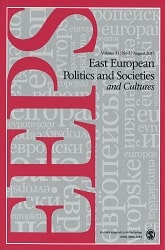The Production of (Un)deserving and (Un)acceptable: Shifting Representations of Migrants within Political Discourse in Slovakia
The Production of (Un)deserving and (Un)acceptable: Shifting Representations of Migrants within Political Discourse in Slovakia
Author(s): Lenka KissováSubject(s): Political Philosophy, Governance, Social differentiation, Nationalism Studies, Migration Studies, Sociology of Politics, Asylum, Refugees, Migration as Policy-fields
Published by: SAGE Publications Ltd
Keywords: refugees; political discourse; nationalism; sovereignty; Christianity; CEE;
Summary/Abstract: The article examines political discourse in Slovakia, particularly the representations of and ideas about refugees and the relevant topics employed in political, explanations and representations of refugees constructed and employed within political argumentation. The text reveals the main discursive legitimation strategies present in the political framing of refugees, resulting in the non-acceptance of non-Christian refugees. Among these, positive us- and negative other-representation, together with denial, moral evaluation, and discursively declared risk based on religion, prove to be the main ones employed for symbolic and physical boundary construction. In this case, the dividing line between “Slovaks” and “others” has been formed around cultural (religious) adaptability, consequently connected to (un)deservingness of solidarity. Different topics are employed before and after adoption of the European Union refugee redistribution system. Economic interests, border protection, and organized crime are applied as main themes of legitimation strategies in the pre-quota period, while cultural interest, identity protection, and terrorism are employed in the post-quota period. They function as a background for argumentation, knowledge production, political decision-making and wider identity-building and national self-determination processes. In the wider context of globalization and Europeanization trends, Christianity becomes an iconic response to global changes and it is used as a mobilizing tool for invoking nationalist and anti-European Union sentiment. Moreover, as the political strategies and responses employed in other Central and Eastern European countries are similar, the Slovak case might be applied more generally and, thus, provide a deeper understanding of the political responses and state-building processes of other countries in the region.
Journal: East European Politics and Societies
- Issue Year: 32/2018
- Issue No: 04
- Page Range: 743-766
- Page Count: 24
- Language: English
- Content File-PDF

